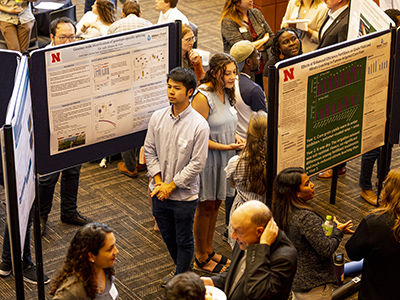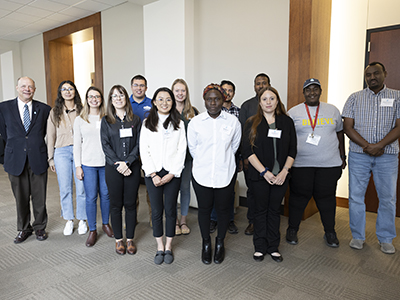DWFI funds eight new students working on mission-related projects

Credit: DWFI
Since it was initiated in 2014, the Daugherty Water for Food Global Institute’s student support program has made more than 100 awards to DWFI Faculty Fellows supporting postdoctoral, graduate and undergraduate students on all four University of Nebraska campuses and invested $3.8 million, of which $3.2 million has been matched one-to-one by faculty. The awards provide stipends to students working on projects that contribute to the institute’s mission to have a lasting impact on achieving more food security with less pressure on scarce water resources.
Overall, the grants program supports interdisciplinary faculty research while enriching the education of students who will one day be scientific leaders in the effort to feed the world’s growing population with limited natural resources.
DWFI supported eight new students in FY22, in addition to 24 returning students who will continue their research and to receive DWFI funding. In spring 2023, DWFI completed its program proposal review for the upcoming year and 11 Faculty Fellow proposals were approved for student support funding. DWFI plans to have more than 30 active student support awards on all four University campuses in FY24.
DWFI hosts fall welcome for supported students

Credit: DWFI
In September 2022, DWFI hosted a fall welcome event for its supported students. Intended to welcome students into their fall semester at the University of Nebraska and give students a sense of what it means to be a part of the institute, Executive Director Peter McCornick kicked off the event with an introduction to the organization’s mission. Director of Research Christopher Neale then gave an overview of DWFI’s significant research impacts and outputs.
With an angle on research communication, DWFI Director of Communications Frances Hayes moderated a panel with Fernanda Souza Krupek, a former DWFI supported student and current UNL Agronomy & Horticulture graduate research assistant, as well as Jocelyn Bullock, UNL CASNR coordinator for graduate student professional development. The two shared valuable information on the importance of communicating research clearly and effectively.
DWFI Communications Specialist Arianna Elnes gave a presentation on communicating impacts, and an overview on properly attributing DWFI funding and leveraging the institute's logo. The day concluded with a networking reception, which included DWFI Faculty Fellows, staff and other colleagues.
Spring research forum shares work from supported students
DWFI held its annual Water for Food Student Research Forum in April 2023 at the Wick Alumni Center on the University of Nebraska–Lincoln’s city campus. The event featured a trainer and facilitator specializing in building relationships of respect and empathy. Additionally, students receiving support from DWFI and their Faculty Fellow advisors shared results from their research and networked with other students, faculty, and the DWFI team. Newly-awarded students were also invited to attend and will begin to receive funding from the institute in the 2023-2024 academic year.
FY 2023 Annual Report
- Overview
- Introduction
-
Research and Policy
-
Global
- Brazilian agricultural state looks to Nebraska and DWFI to sustainably manage water resources
- Irrigation equipment ownership not always best for smallholder farmers
- McCornick and Neale re-elected to World Water Council, DWFI involved in preparations for the World Water Forum
- Understanding the agtech ecosystem in India can spur future investments
-
Regional + National
- DAWN Project testing its decision-support tools with corn and soybean growers
- Water Center director helps City of Lincoln find second water source
- Water, Climate and Health program makes an impact in Nebraska
- DWFI's flux tower network now helps validate carbon credits
- Understanding climate’s effect on the health of Americans
- Groundwater transfer success stories guide water managers in meeting local water needs
- Advancements in crop modeling help adapt to climate change
-
Global
-
Education
- Faculty Fellows
-
Supported Students
- DWFI funds eight new students working on mission-related projects
- DWFI continues support of Platte Basin Timelapse interns
- Estimation of manure nutrient capacity in Nebraska minimizes water quality impacts
- Could cover crops replace offset in-season corn fertilizer?
- Congratulations to DWFI-supported student graduates
-
Communication
- Digital and online engagement connects DWFI with its global audience
- Coverage of DWFI research and events reaches more than 219 million people
- Creative storytelling used to amplify DWFI smallholder irrigation research outputs
- DWFI expertise tapped for national reports and publications
- DWFI staff receive well-deserved recognition
- 2022 Nebraska Water Center Annual Report now available
-
Outreach and Events
- Global Conference draws international audience to address water and food security
- On-farm event in Western Nebraska strengthens partnerships, spurs new ideas
- Engagement recovers to pre-pandemic levels
- Drought at forefront of discussions at Platte River Basin Conference
- 49th Annual Water Tour broadens knowledge about Nebraska water
- Nebraska Water Center seminars focus on hot topics in Nebraska Water
- Development
- Resources
- Search
FY 2023 Annual Report
- Overview
- Introduction
-
Research and Policy
-
Global
- Brazilian agricultural state looks to Nebraska and DWFI to sustainably manage water resources
- Irrigation equipment ownership not always best for smallholder farmers
- McCornick and Neale re-elected to World Water Council, DWFI involved in preparations for the World Water Forum
- Understanding the agtech ecosystem in India can spur future investments
-
Regional + National
- DAWN Project testing its decision-support tools with corn and soybean growers
- Water Center director helps City of Lincoln find second water source
- Water, Climate and Health program makes an impact in Nebraska
- DWFI's flux tower network now helps validate carbon credits
- Understanding climate’s effect on the health of Americans
- Groundwater transfer success stories guide water managers in meeting local water needs
- Advancements in crop modeling help adapt to climate change
-
Global
-
Education
- Faculty Fellows
-
Supported Students
- DWFI funds eight new students working on mission-related projects
- DWFI continues support of Platte Basin Timelapse interns
- Estimation of manure nutrient capacity in Nebraska minimizes water quality impacts
- Could cover crops replace offset in-season corn fertilizer?
- Congratulations to DWFI-supported student graduates
-
Communication
- Digital and online engagement connects DWFI with its global audience
- Coverage of DWFI research and events reaches more than 219 million people
- Creative storytelling used to amplify DWFI smallholder irrigation research outputs
- DWFI expertise tapped for national reports and publications
- DWFI staff receive well-deserved recognition
- 2022 Nebraska Water Center Annual Report now available
-
Outreach and Events
- Global Conference draws international audience to address water and food security
- On-farm event in Western Nebraska strengthens partnerships, spurs new ideas
- Engagement recovers to pre-pandemic levels
- Drought at forefront of discussions at Platte River Basin Conference
- 49th Annual Water Tour broadens knowledge about Nebraska water
- Nebraska Water Center seminars focus on hot topics in Nebraska Water
- Development
- Resources
- Search
Top image caption
The Water for Food Research Forum was held in the spring, giving DWFI supported students the opportunity to showcase their work.
Credit: DWFI
Related Articles
Congratulations to DWFI-supported student graduates
Congratulations to the following DWFI supported students who graduated during that last academic year!
Estimation of manure nutrient capacity in Nebraska minimizes water quality impacts
Using manure fertilizer instead of inorganic fertilizer can better enhance the soil organic matter content while improving soil.
Could cover crops replace offset in-season corn fertilizer?
Over-application of nitrogen fertilizer on crop fields often leads to increased groundwater contamination, as well as a reduction in net financial returns for farmers.
COOKIE USAGE:
The University of Nebraska System uses cookies to give you the best online experience. By clicking "I Agree" and/or continuing to use this website without adjusting your browser settings, you accept the use of cookies.

